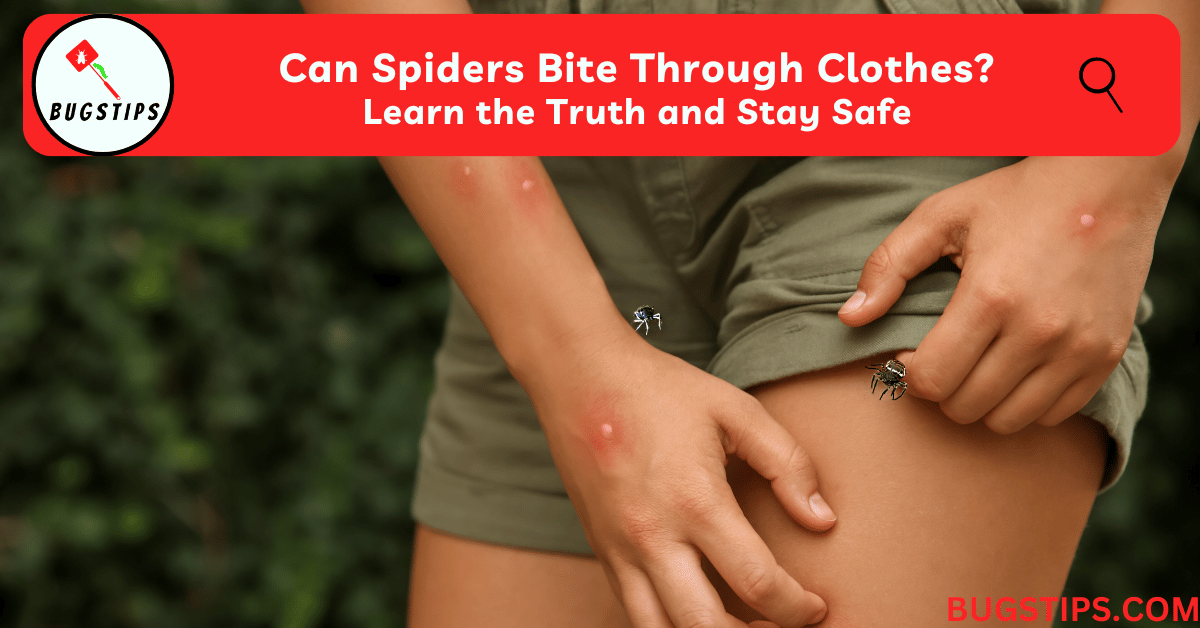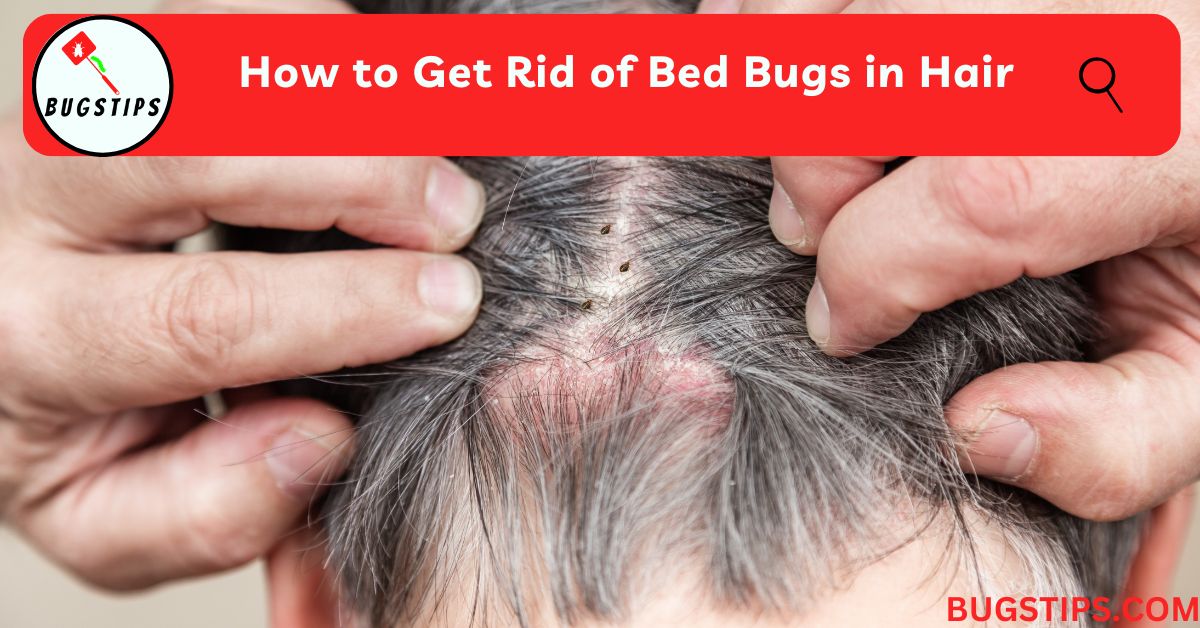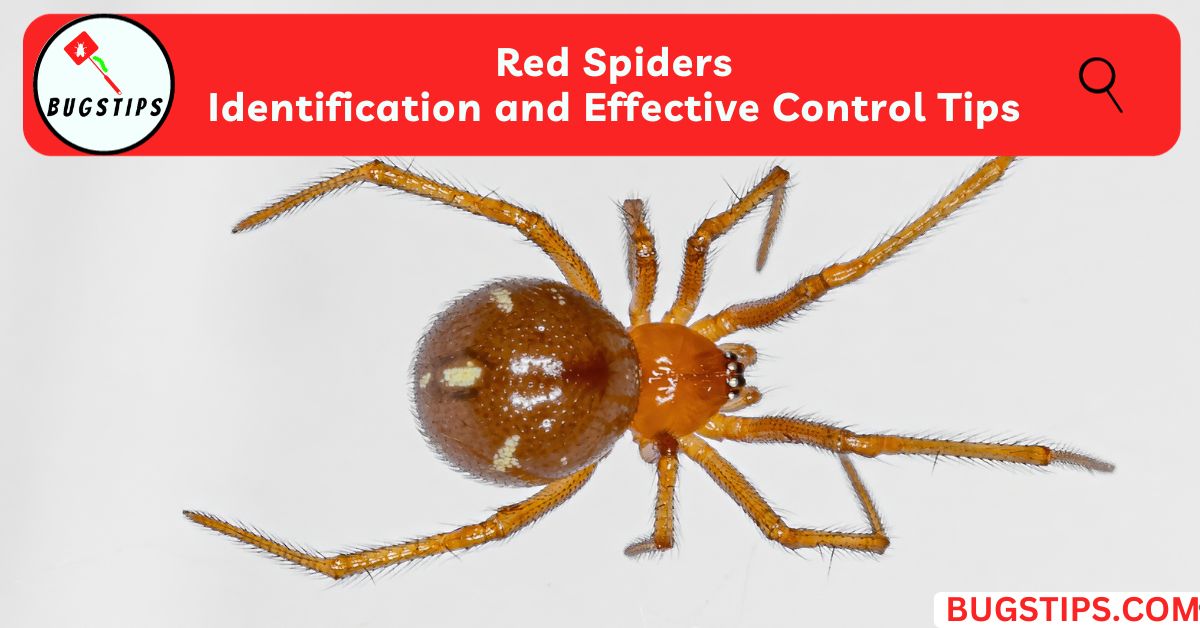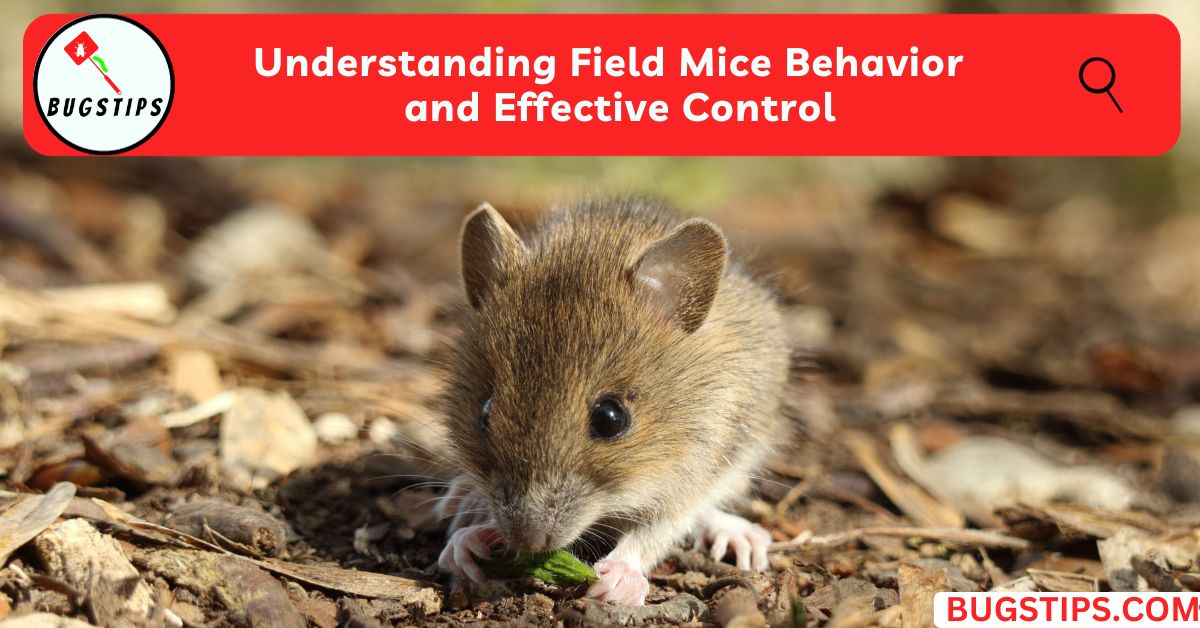This post may contain affiliate links which means as an Amazon Associate, this site may earn a small commission on qualified purchases made through links at no extra cost to you. Learn more on Affiliate Disclosure
Are you curious about whether spiders can bite through your clothes? Many people wonder if wearing leggings, dresses, or gloves provides any protection against spider bites. In this article, we will explore everything you need to know about spider bites and their ability to penetrate various materials, including the question, “Can spiders bite through clothes?”
We’ll cover a range of topics related to spider bites, including how to identify a spider bite, the symptoms you may experience, and what materials spiders can bite through. We’ll take a closer look at leggings, dresses, socks, shoes, gloves, and other clothing items to see whether they offer any protection against spider bites.
We’ll also explore some common misconceptions about spider bites and discuss strategies for preventing them.
So, whether you’re planning a hike in the woods or simply want to be prepared for any encounter with these eight-legged creatures, read on to learn more about whether spiders can bite through clothes and other materials.
What Makes a Spider Bite You?
Spiders bite for various reasons, such as self-defense, mating, or because they feel threatened. While most spider bites are harmless and cause only mild symptoms, some species of spiders can deliver venomous bites that require medical attention.
Here are some most dangerous spiders:
- Black Widow Spider: This spider is notorious for its venomous bite, which can cause severe pain, muscle spasms, and even death in some cases.
- Brown Recluse Spider: This spider’s bite can cause a range of symptoms, including fever, chills, and tissue death at the site of the edge.
- Funnel-Web Spider: Found primarily in Australia, this spider can deliver a venomous bite that causes muscle spasms, difficulty breathing, and even death.
It's important to note that spiders typically don't go out of their way to bite humans. They will usually only bite if they feel threatened or provoked. If you encounter a spider, it's best to leave it alone and give it plenty of space.
Can You Feel a Spider Bite?
One of the common questions people ask when it comes to spider bites is whether they can feel the spider bite them. The answer is not as simple as a yes or no because it depends on several factors, such as the type of spider and the person’s sensitivity to the bite.
Symptoms of spider bites can range from mild to severe, depending on the spider’s venom and the amount injected into the person’s body.
Some of the common symptoms of spider bites include redness, swelling, pain, itching, and inflammation. In severe cases, spider bites can cause muscle cramps, fever, chills, and difficulty breathing.
It is important to note that not all spider bites are dangerous, but it’s always better to err on the side of caution and seek medical attention if you suspect you have been bitten by a spider.
This is especially true if you experience severe symptoms, such as difficulty breathing or muscle cramps.
Related Article – Are Woodlouse Spiders Poisonous?
So yes it's possible to feel a spider bite, but not always. The severity of the symptoms can vary depending on the type of spider, the amount of venom injected, and the person's sensitivity to the bite.
Can Spiders Bite Through the Skin?
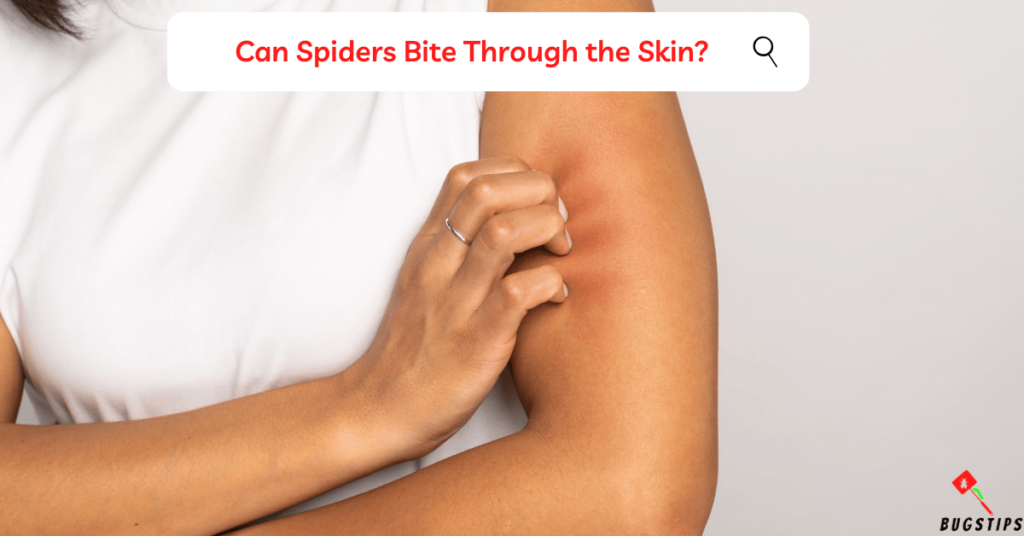
Some spiders such as the brown recluse spider, hobo spider, and camel spider have fangs and venom that can penetrate human skin. However, spider bites are rare, and most spiders are not dangerous to humans.
Spider fangs are their primary means of hunting and self-defense. They use their fangs to inject venom into prey and potential predators. For humans, this means that some spider species can deliver a painful and potentially harmful bite.
Spider fangs are designed to penetrate the exoskeletons of insects and other small animals.
While human skin is thicker than an insect’s exoskeleton, some spiders can still bite through it. This is why some spider bites can penetrate the skin and cause harm to humans.
However, it’s important to note that most spider bites are not harmful and do not require medical treatment. In fact, the vast majority of spiders are not venomous to humans, and even venomous spiders typically only bite when they feel threatened or provoked.
Related Article – Spider Under Toilet Seat?
But, to answer the question, yes, spiders can bite through the skin, but the severity of the bite depends on the spider species and individual circumstances.
Can Spiders Bite Through Clothes?
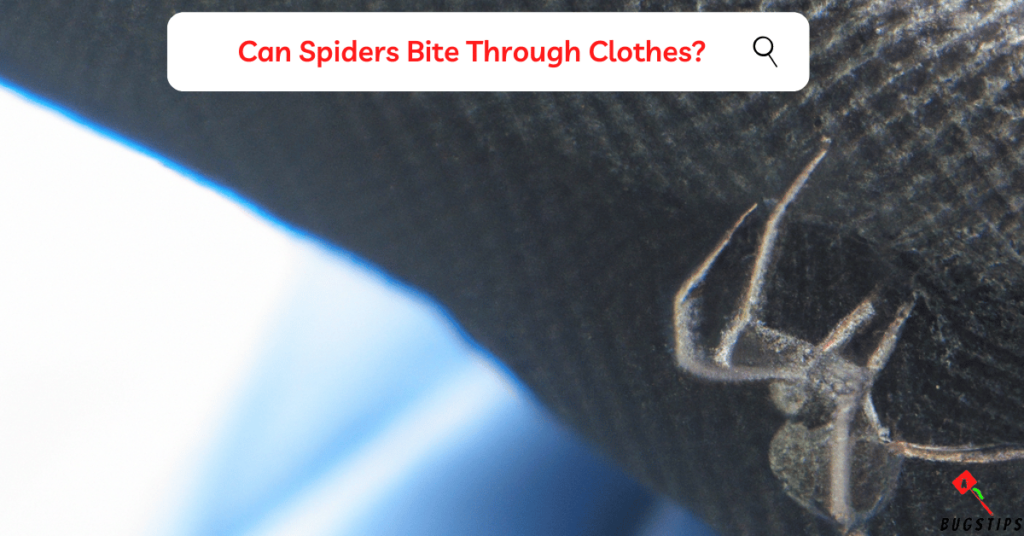
The answer is yes, some spiders are capable of biting through certain types of clothing materials. Spiders use their fangs and jaws to bite and inject venom into their prey or predators, and some materials may not provide enough of a barrier to prevent a spider from biting through.
The likelihood of a spider biting through clothing depends on the type of material and the size of the spider.
Thicker materials such as denim or leather may provide more protection than thinner materials like cotton or nylon. However, even thick materials may not be completely impenetrable to spider fangs.
What Spiders Can Bite Through Clothes?
While most spiders are not capable of biting through clothing materials, some species have fangs that are strong enough to penetrate certain fabrics.
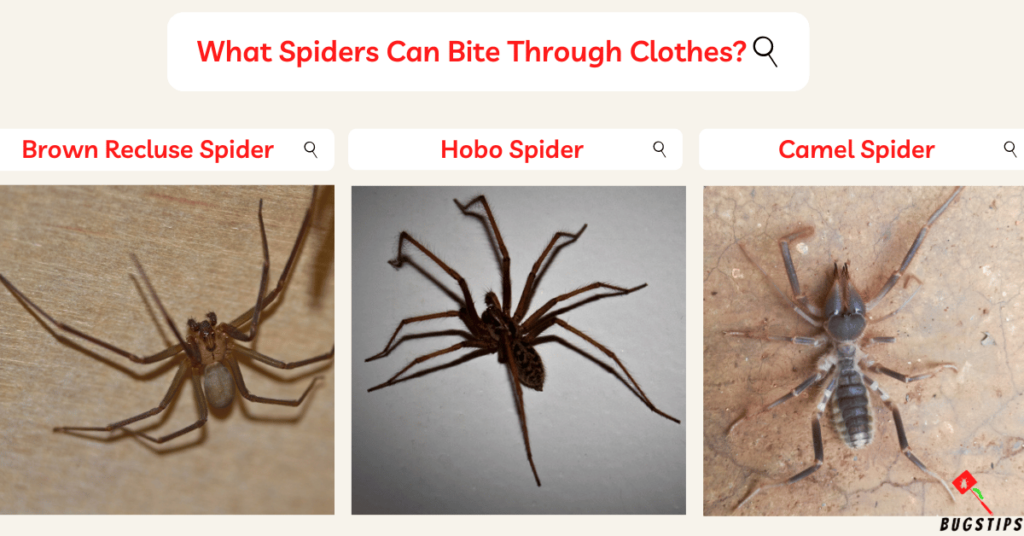
Brown Recluse Spider
The brown recluse spider is known to be capable of biting through clothing, especially thin or stretchy fabrics.
These spiders are typically found in warm, dry regions of the United States and can deliver venomous bites that may cause serious health problems.
Hobo Spider
The hobo spider is another species that may be able to bite through clothing, especially if the fabric is thin or easily penetrated.
These spiders are typically found in the Pacific Northwest region of the United States and may deliver venomous bites that can cause skin lesions or other health problems.
Camel Spider
The camel spider, also known as a wind scorpion, is another species that has been known to have the ability to bite through clothing.
These spiders are commonly found in desert regions of the world and their bites can cause discomfort, swelling, or other health issues.
You’ll Also Like – Do Spiders Make Noise?
Can Spiders Bite Through Leggings?
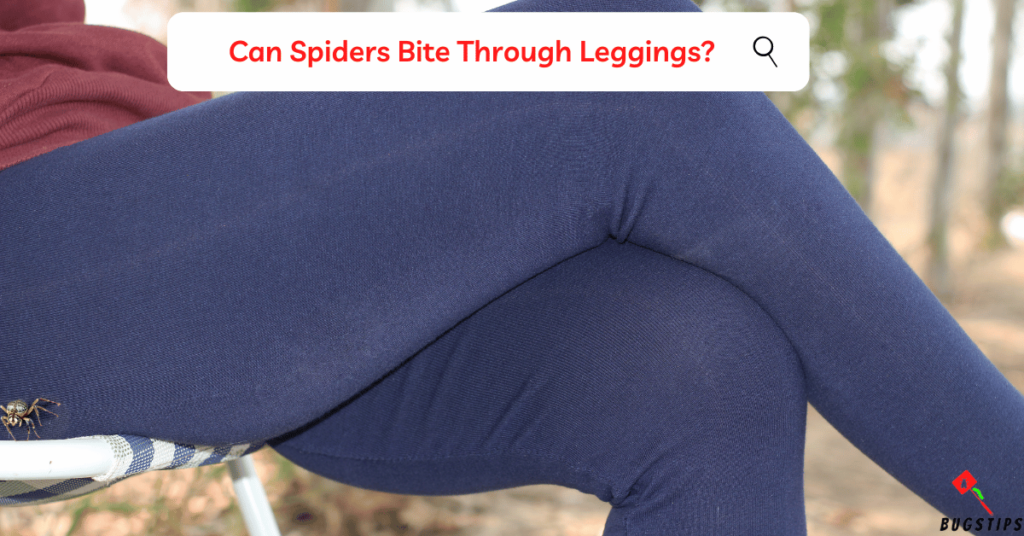
Leggings are a popular clothing item for many people, but the question arises: can spiders bite through leggings? Leggings are typically made of a thin and stretchy material, which may make some people concerned about the possibility of spider bites.
The good news is that leggings are usually thick enough to prevent spiders from being able to bite through them. The thickness of the material can act as a barrier between the spider’s fangs and your skin.
However, it is important to note that some spiders have fangs that are long enough to penetrate even thicker materials.
Another factor to consider is the location where you are wearing leggings. If you are in an area where there is a higher risk of encountering spiders, it is important to take precautions to protect yourself.
Can Spiders Bite Through Denim and Dresses?

While not completely impenetrable, denim and thick dresses may provide more protection against spider bites than thinner materials like leggings or nylon.
Denim is a relatively thick fabric and can provide some protection against spider bites. However, some spiders with larger fangs may be able to penetrate through the denim in certain areas, especially if the fabric is worn thin or stretched.
Dresses, on the other hand, can vary greatly in thickness and material. Thicker materials like wool or heavy cotton may provide some protection, while thinner and more stretchy materials like polyester or spandex may offer little to no protection against spider bites.
Can Spiders Bite Through Socks?

Thicker socks made from materials like wool or cotton may provide some protection against spider bites, and thinner socks made from materials like nylon or silk may not provide as much of a barrier.
It’s also important to note that the ability of a spider to bite through socks also depends on the size of the spider and the thickness of the fabric. Additionally, spiders are not typically attracted to dirty or smelly socks, so the risk of encountering a spider inside your socks is relatively low.
To reduce your risk of a spider bite through socks, it’s a good idea to wear thicker socks made from materials like wool or cotton, especially if you’ll be spending time in areas where spiders are prevalent.
It’s also a good idea to shake out socks before putting them on, especially if they’ve been sitting in storage for a long period of time.
Can Spiders Bite Through Shoes?
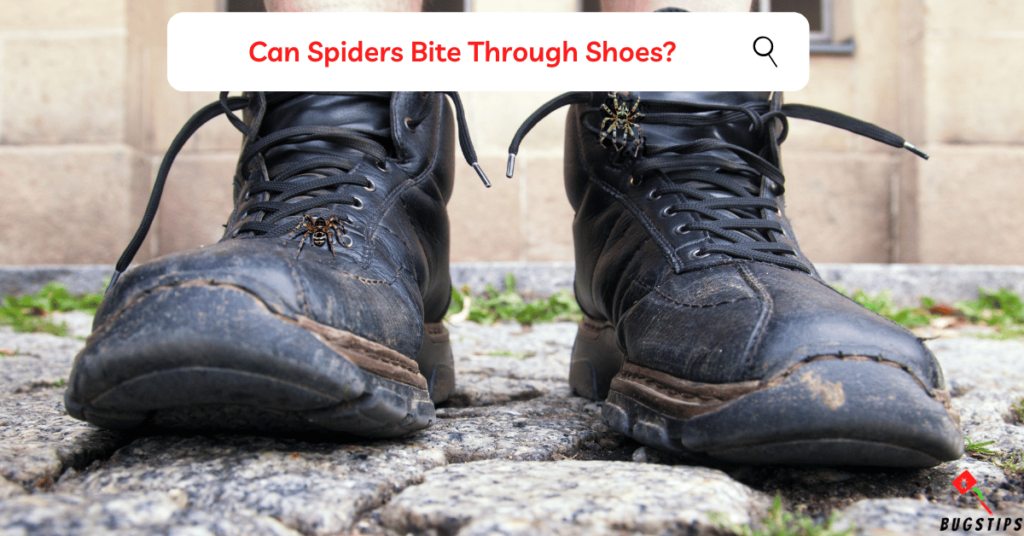
While it is rare, spiders can sometimes crawl into shoes, including boots and other types of footwear. This raises the question: can spiders bite through shoes?
In general, the answer is no. Most shoes are made of materials that are thick enough to prevent spiders from biting through.
However, it is important to note that some spiders, like the brown recluse, have strong jaws and sharp fangs that can potentially penetrate certain types of shoes, such as thin canvas or fabric sneakers.
It is also possible for spiders to hide inside shoes and bite when they are disturbed or feel threatened. This is why it is important to shake out your shoes before putting them on, especially if they have been stored in a place where spiders may be present.
High heels can also pose a risk as spiders may attach to them while they are on the ground and then bite when the shoe is put on. However, this is also rare and should not be a significant cause for concern.
You’ll Also Like – What Happens When You Destroy Spider Webs?
Can Spiders Bite Through Latex and Nitrile Gloves?
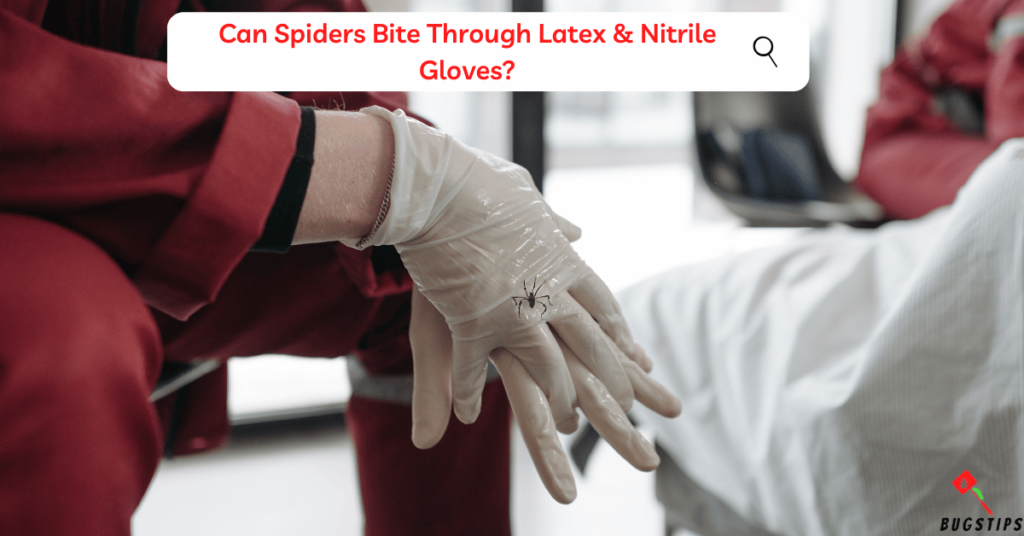
Latex and nitrile gloves are commonly used as a barrier to protect against a variety of substances, including chemicals, bacteria, and viruses. However, many people may wonder if these gloves can also protect them from spider bites.
In general, it is unlikely for spiders to bite through latex or nitrile gloves. These gloves are made of durable materials that provide a thick barrier between the skin and the spider’s fangs.
Additionally, the texture of the gloves can make it difficult for the spider to get a good grip and penetrate the material.
However, it is important to note that gloves can become damaged over time, especially with frequent use. Small tears or holes in the gloves can compromise the protective barrier and allow spiders to bite through the material.
Therefore, it is important to regularly inspect gloves for any signs of damage and replace them as needed.
It is important to keep in mind that wearing gloves may not always protect you from all types of spider bites. As explained above certain spiders, like the brown recluse spider, have long fangs that can penetrate through thick materials, including gloves.
Therefore, it is important to avoid handling spiders with bare hands or with gloves, especially if you are not trained to do so.
If you need to remove a spider from your home, it is best to contact a pest control professional who has the necessary equipment and expertise to handle spiders safely.
Related Article – How to Trap Spiders at Home: Only Guide You Need
If you do get bitten by a spider, even while wearing gloves, it is important to seek medical attention immediately, especially if you experience severe symptoms.
Can Spiders Bite Through Plastic?
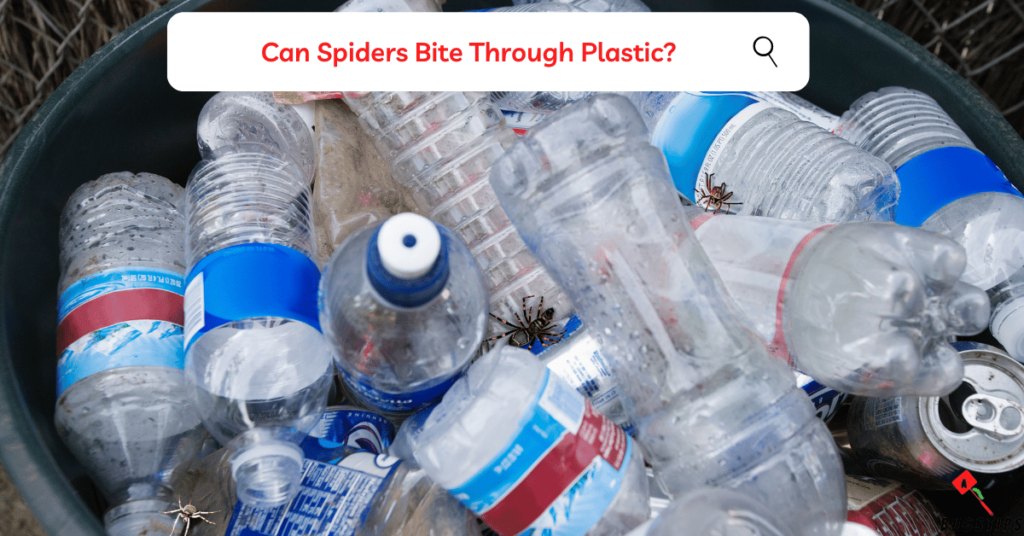
Plastic is a relatively thick and durable material that can protect against many types of bites and stings.
However, it is not completely impenetrable, and spiders may be able to bite through some types of plastic. The thickness and quality of the plastic are important factors that determine its effectiveness as a barrier against spider bites.
Thin plastic bags or wraps may not provide adequate protection against spider bites, as the fangs of some spiders can easily pierce through these materials.
On the other hand, thicker and more durable plastics, such as those used in industrial settings, may be more effective at preventing spider bites.
It is also important to note that plastic may not be the best material to use when attempting to catch or handle spiders, as they may still be able to bite through the material or find small gaps to escape through.
In such cases, it is recommended to use other materials or tools that are specifically designed for handling spiders.
Can Spiders Bite Through Wood?
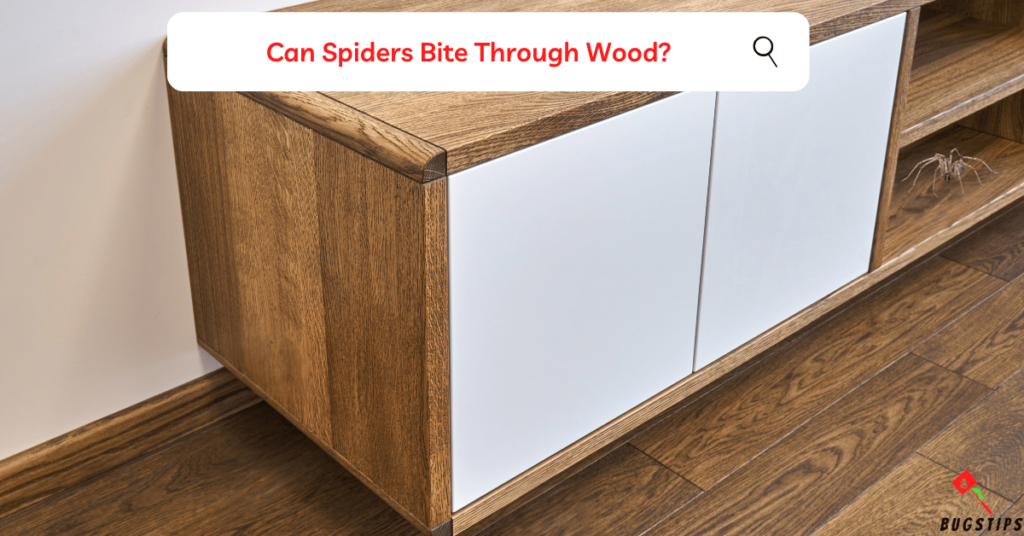
No, spiders cannot bite through wood. Wood is a solid material that is too thick for a spider’s fangs to penetrate.
However, it’s important to note that spiders can still hide in wood, especially if it’s been sitting outside or in a damp area.
Some spiders may lay their eggs in wood or create their webs on wooden structures. So It’s a good idea to inspect wood before handling it to reduce the risk of encountering spiders.
While spiders cannot bite through wood, it’s still important to take precautions to reduce the risk of encountering them and ensure that there are no spiders or spider nests present.
Can Spiders Bite Through Neoprene?
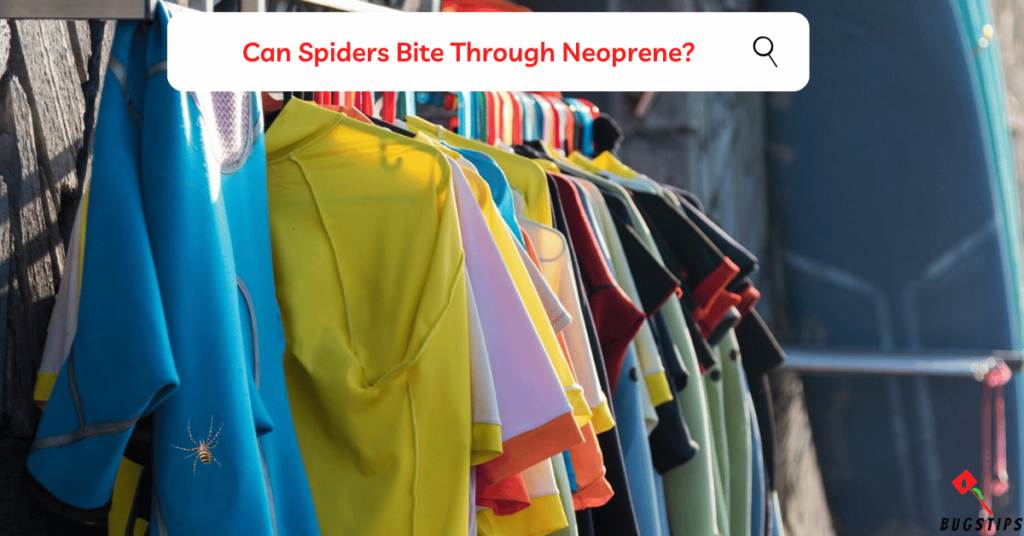
Neoprene is a synthetic rubber material that is often used in wetsuits, gloves, and other protective gear for activities such as diving, surfing, and fishing.
And It’s unlikely that spiders will be able to bite through the neoprene, as it is a thick and durable material that provides a good barrier against spider fangs.
However, Some spiders may still be able to bite through neoprene if they are able to find a weak spot or gap in the material. Therefore, it is important to be cautious when wearing neoprene in areas where spiders are present and take steps to avoid contact with them.
And make sure to shake out clothing items and store them in sealed containers.
while it’s unlikely that spiders will be able to bite through the neoprene, taking precautions to reduce the risk of encountering spiders is still important when working or spending time in areas where spiders are prevalent.
What Can Be Mistaken for a Spider Bite?
If you have a red, swollen, and itchy bump on your skin, you may assume it’s a spider bite. However, it’s possible that other insects can bite through clothing, leading to similar symptoms that can be mistaken for spider bites.
- Insect bites: Mosquitoes, fleas, bedbugs, and ticks can all leave bites that look similar to spider bites, even if you’re wearing clothes.
Related Article – 20 Surprising Tiny Bugs in Bed You Need to Know About
- Clothing irritation: Wearing tight-fitting clothes or rough materials can cause skin irritation that may be mistaken for a spider bite.
- Allergic reactions: Allergic reactions to certain fabrics or detergents can cause hives, redness, and itching that may be confused with spider bites.
- Skin infections: Bacterial or viral infections, such as cellulitis or shingles, can cause red, painful bumps that may be similar in appearance to spider bites, even if they occur under clothing.
- Contact dermatitis: Exposure to certain fabrics, dyes, or other clothing materials can cause a rash that looks like a spider bite.
- Cancer: In rare cases, skin cancer can present itself as a red bump or lesion that may be mistaken for a spider bite, even if it occurs under clothing.
Not all skin irritations are caused by spider bites, and it is important to consider other factors, such as clothing irritation and allergies, before assuming a spider bite is the cause. If you are unsure about the cause of a skin irritation, it is always best to consult with a medical professional for proper diagnosis and treatment.
How to Prevent Spiders From Biting Through Clothes?
If you’re concerned about spiders biting through your clothes, there are several steps you can take to reduce the risk.
Wear thick fabrics
Thick fabrics like denim, wool, or leather can provide more protection against spider bites than thinner materials. Choose clothing items made from these materials when spending time in areas where spiders are prevalent.
Wear long sleeves and pants
Covering your skin with clothing is the best way to prevent spider bites. Choose light-colored clothes that allow air to circulate to keep you cool.
Shake out clothing items
Before putting on clothing items that have been sitting in storage, be sure to shake them out to dislodge any spiders or other insects that may be hiding inside.
Store clothing in sealed containers
To reduce the risk of spiders and other insects hiding in your clothing, store them in sealed containers and sealable plastic bags to prevent spiders and other insects from getting inside.
Use insect repellent
Applying insect repellent to your skin and clothes can help keep spiders and other insects away. Look for products containing DEET or picaridin, which are effective against spiders.
Use spider deterrents
There are several natural spider deterrents that you can use to keep spiders away from your home. Some popular options include peppermint oil, vinegar, and chestnuts.
Wear gloves and protective clothing
When working in areas where spiders are prevalent, wear gloves and other protective clothing to reduce your risk of being bitten.
Inspect wood and other materials
Before handling wood or other materials that may be hiding spiders, inspect them carefully to reduce the risk of encountering spiders. Spiders can hide in wood, but they can also hide in clothing items that have been left in storage for a long period of time.
Keep your environment clean
Spiders are attracted to clutter and dark, damp areas. Keeping your environment clean and clutter-free can help to reduce the risk of spiders taking up residence in your home or workplace.
Related Article – How to Trap Spiders at Home: Only Guide You Need
By following these tips, you can reduce your risk of encountering spiders and potentially being bitten through clothing and other materials. This allows you to enjoy your time outdoors or working with materials without worrying about spider bites.
Final Thoughts
So, to sum it up, spiders can bite through some types of clothing materials like thin fabrics, but thicker materials like denim, wool, or leather can provide more protection against spider bites. Leggings and shoes made from thin materials like plastic can also be vulnerable to spider bites.
Understanding what materials spiders can bite through is an important step in protecting yourself from spider bites. While most spiders are not harmful to humans, it’s still important to take precautions, especially if you live in an area where spiders are common.
Wearing gloves made from thick materials, inspecting wood and other materials carefully, and storing clothing in sealed containers can help to reduce your risk of encountering spiders and potentially being bitten.
it’s important to seek medical attention if you experience any severe symptoms or an allergic reaction. With the right knowledge and precautions, you can stay safe and protect yourself from spider bites.
Can yellow sac spiders bite through clothes?
Yes, yellow sac spiders can bite through clothes, especially thin fabrics.
Can a brown recluse spider bite through clothes?
Yes, brown recluse spiders have long fangs that can penetrate through some types of clothing.
Can spiders bite through jeans?
It depends on the thickness of the jeans. Spiders may have difficulty biting through thick denim jeans, but they may be able to bite through thinner materials.
Can spiders bite through underwear?
Yes, spiders can bite through thin fabrics like underwear, but it is relatively rare.
Why would a spider randomly bite me under my shirt?
Spiders typically only bite humans when they feel threatened or provoked. It’s possible that the spider crawled onto your shirt and felt trapped, leading it to bite in self-defense.
Do spiders bite humans while sleeping?
It’s unlikely for spiders to bite humans while they are sleeping since spiders tend to be more active at night. However, it is not impossible for spiders to bite while someone is sleeping.
Do spider bites itch?
Yes, spider bites can cause itching and other symptoms such as redness and swelling.
How do I keep spiders out of my shoes?
To keep spiders out of your shoes, store them in a sealed container when not in use, and inspect them carefully before putting them on. You can also try placing sticky traps or essential oils like peppermint or eucalyptus inside your shoes to deter spiders.
Resources – (for further reading)
The Mayo Clinic – Spider bites
verywellhealth – Infected Skin Lesions That Are Not From Spider Bites
wikihow – How to Avoid Getting Bitten by a Black Widow
Cleveland Clinic – Spider Bites

